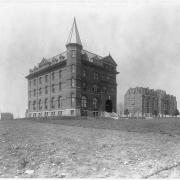Fisk University

Fisk University of Nashville, founded in 1866, is a private, coeducational, and one of the first and most notable historically black colleges in the United States. Fisk school was named after General Clinton B. Fisk, who gave the school its original facilities in a former Union army barracks, and the college was named a university the next year in 1867 ("Fisk University" [Encyclopædia Britannica]). As freed slaves were establishing makeshift schools at the conclusion of the Civil War, the opening of Fisk University was well received by hundreds of excited black students at the school's opening ("Fisk University" [American Experience]). The school had a difficult beginning with years of financial strains and worries along with poor representation, for the school did not receive a black president until a few decades into the 20th century. In the year 1909, Booker T. Washington was elected to Fisk's Board of Trustees. This decision ensured the school's survival during the early 20th century as Washington and the Board worked with other black colleges to establish uniform graduation requirements, raise standards, helped to ensure the college a million dollar endowment for the year 1920 ("Fisk University" [American Experience]). The history and location of this school in the South paved a more beneficial road to success for black collegiates. Washington, a man who struggled to pay a small debt for Hampton as a student, assisted in greatly improving the future of the school for years after his service on the Board of Trustees at Fisk. One can see his focus on financial, material, and intellectual improvement for African Americans over a great push for Civil Rights laws. Similarly, Fisk greatly benefitted Du Bois in that he was well-prepared to teach students in poorer areas at a younger age, and the reputation of the college called his great mind back after completing his work for the poor community he once helped.
Works Cited
“Fisk University.” American Experience, Public Broadcasting Service, www.pbs.org/wgbh/americanexperience/features/singers-fisk-university/. Accessed 2 Apr. 2024.
“Fisk University.” Encyclopædia Britannica, Encyclopædia Britannica, INC., 1 Mar. 2024, www.britannica.com/topic/Fisk-University.
Parent Map
Coordinates
Latitude: 36.168936700000
Longitude: -86.804930800000
Longitude: -86.804930800000

